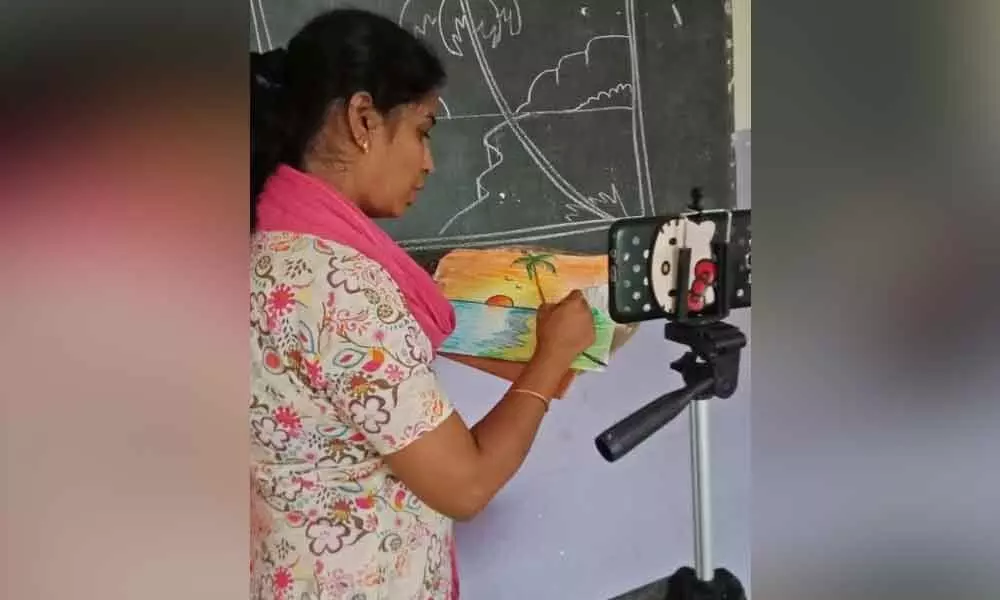Live
- Chanchalguda Jail Officials Say They Haven't Received Bail Papers Yet, Allu Arjun May Stay in Jail Tonight
- BJP leaders present evidence of illegal voters in Delhi, urge EC for swift action
- Exams will not be cancelled: BPSC chairman
- Nagesh Trophy: Karnataka, T.N win in Group A; Bihar, Rajasthan triumph in Group B
- Economic and digital corridors to maritime connectivity, India and Italy building vision for future, says Italian Ambassador
- SMAT 2024: Patidar's heroics guide Madhya Pradesh to final after 13 years
- CCPA issues notices to 17 entities for violating direct selling rules
- Mamata expresses satisfaction over speedy conviction in minor girl rape-murder case
- Transparent Survey Process for Indiramma Housing Scheme Directed by District Collector
- District SP T Srinivas Rao, IPS, Conducts Annual Inspection at Dharur Police Station
Just In
Visakhapatnam: Virtual system of learning can never replace traditional one


Virtual system of learning is no longer an occasional timetable feature for students, especially in times of a global health crisis.
• Traditional classroom learning can never be replaced with online classes as classroom is the place to imbibe moral values, says Correspondent of Andhra University English Medium School B Prasada Rao
• Students coming from poor families cannot be covered under the virtual system as they do not have access to smartphones, points out K Durga Prasad, Headmaster of GVMC Primary School at NGGO's Colony, Akkayyapalem
• Even if those coming from poorer sections possess smartphones, their parents lack knowledge of downloading apps for classes as most of them are daily wage earners
Visakhapatnam: Virtual system of learning is no longer an occasional timetable feature for students, especially in times of a global health crisis.
As the classrooms remain shut since March in the wake of coronavirus outbreak followed by subsequent imposition of lockdown, virtual classes gain momentum to engage students academically.
For those concerned about sending their wards to the school campus, virtual method of learning offers respite.
In order to meet the current requirement, school managements are working out strategies to opt for an online mode of teaching. "Like the traditional classroom setting that has an emotional connect between students and teachers, online classes should be taught in an engaging manner to build a connect between teachers and students. However, discipline should be maintained during virtual classes as many have the tendency to take the platform for granted. Wearing a uniform for the online class, introducing activity-based learning methods and exchanging syllabus videos help in deriving improved learning outcomes," says Dr Eshwari Prabhakar, Principal of Delhi Public School, Anandapuram branch.
Further, the school Principal adds that maintaining social distancing and hand hygiene, usage of masks and sanitisers will be a part of the online education so that children will be prepared before heading to the school.
Sharing his views on online learning system, Correspondent of Keystone School D Uday Kumar says, "Though it is difficult to reach out to 400-odd students in our school, imparting virtual lessons in parts would aid in catering to at least half of the strength. At present, the online classes are confined to weekly once for pre-primary students and for Classes III to X, there are two periods of virtual classes a day, each session would last for 45 minutes which also includes craft classes. But, it is too early to predict whether virtual classes will work in the long run or not."
No access to smartphones: What about the students who do not have access to smartphones? Take for instance, GVMC Primary School at NGGO's Colony Akkayyapalem. The school has 130-plus students studying from Classes I to V. "Of them, only 10 per cent have access to smartphones. Even if they have smartphones, they do not know how to download the online Apps for classes. This is because most of their parents are daily wage earners or work as security staff in apartments. In such a scenario, it is very difficult to conduct online classes even if the government decides to go virtual this academic session," opines K Durga Prasad, Headmaster of the school.
Teachers' training: Appreciating the government's contemporary approach, Correspondent of Andhra University English Medium School B Prasada Rao lays emphasis on subject expertise and teacher training.
"Whether it is for the English medium of instruction or opting for virtual classes, priority should be accorded to train the teachers. The focus should be on honing the subject expertise among students to meet emerging needs of the education system.
But, the traditional classroom learning can never be replaced with online classes as classroom is the place to imbibe moral values," he opines.
Digital disadvantages: However, according to a section of parents and teachers, the experiment is not yielding desired result for varied reasons. Increased screen space, lack of seriousness on the part of students, poor Internet access and absence of interaction between students and teachers are some of the digital disadvantages highlighted by them.

© 2024 Hyderabad Media House Limited/The Hans India. All rights reserved. Powered by hocalwire.com






